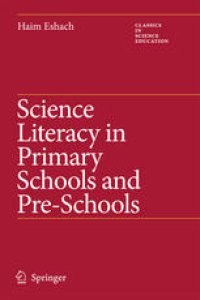
Ebook: Science Literacy in Primary Schools and Pre-Schools
Author: Haim Eshach (eds.)
- Tags: Learning & Instruction, Science Education, Teacher Education, Childhood Education
- Series: Classics in Science Education 1
- Year: 2006
- Publisher: Springer Netherlands
- Edition: 1
- Language: English
- pdf
When it comes to science, many of today's children experience narrow and impoverished learning opportunities, which, as professor Judah Schwartz writes in the preface to this book, lead ulitmately to a mere caricature of science. One source of the problem is the wrong—terribly wrong—belief that science is an inappropriate subject for early elementary education and certainly for kindergarten education.
As a curative to this prevalent and unfortunate situation, this well-written and thought-provoking book presents the state-of-the-art in science education for kindergarten and primary schools. It begins with a thorough theoretical discussion on why it is incumbent on the science educator to teach science already at first stages of childhood. It goes on to analyze and synthesize a broad range of educational approaches and themes such as: inquiry-based teaching; learning through authentic problems; scaffolding; situated learning; learning through projects; non-verbal knowledge; and informal learning. The book also presents fresh novel strategies to science teaching such as learning science through designing, building, evaluating and redesigning simple artifacts; and Inquiry Events. Numerous examples illustrating how the theories presented may be brought into practice are provided.
When it comes to science, many of today's children experience narrow and impoverished learning opportunities, which, as professor Judah Schwartz writes in the preface to this book, lead ulitmately to a mere caricature of science. One source of the problem is the wrong—terribly wrong—belief that science is an inappropriate subject for early elementary education and certainly for kindergarten education.
As a curative to this prevalent and unfortunate situation, this well-written and thought-provoking book presents the state-of-the-art in science education for kindergarten and primary schools. It begins with a thorough theoretical discussion on why it is incumbent on the science educator to teach science already at first stages of childhood. It goes on to analyze and synthesize a broad range of educational approaches and themes such as: inquiry-based teaching; learning through authentic problems; scaffolding; situated learning; learning through projects; non-verbal knowledge; and informal learning. The book also presents fresh novel strategies to science teaching such as learning science through designing, building, evaluating and redesigning simple artifacts; and Inquiry Events. Numerous examples illustrating how the theories presented may be brought into practice are provided.